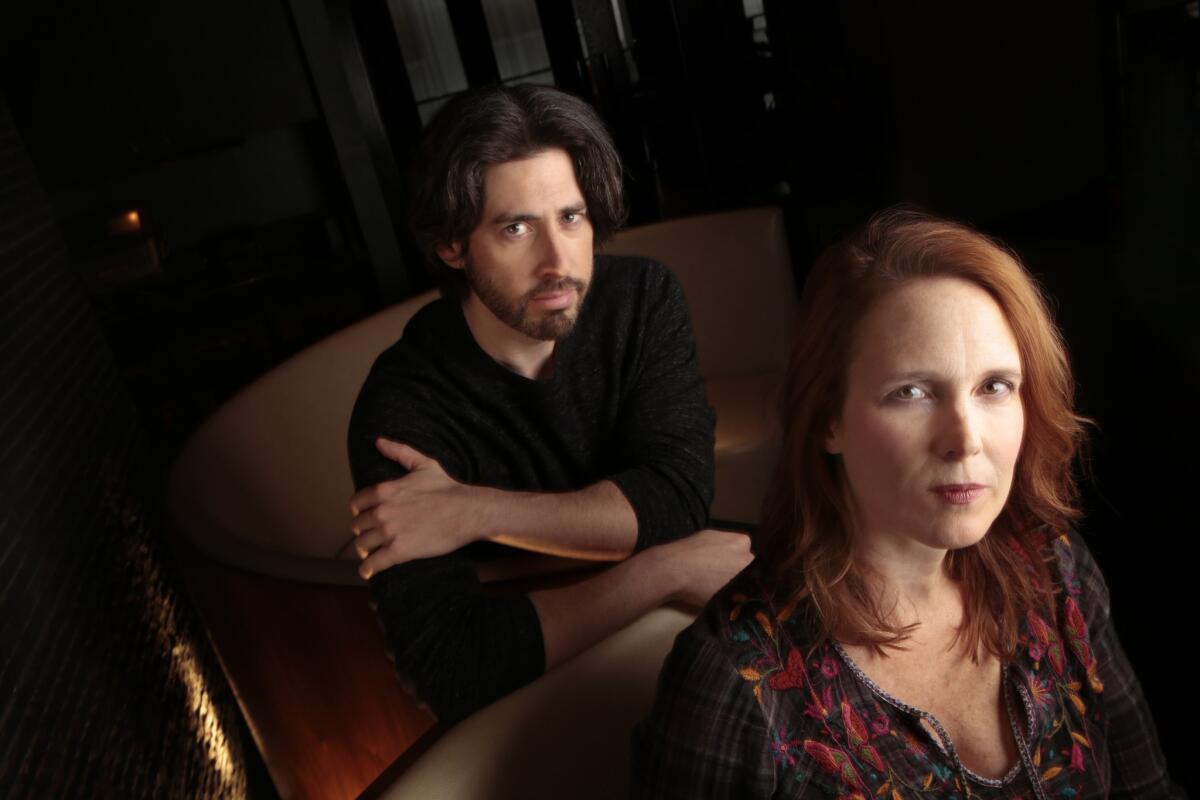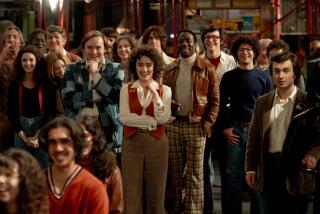Jason Reitman, Erin Cressida Wilson connect on ‘Men, Women & Children’

As the online world has moved to the center of everyday life, it has often been a struggle for movies to depict the changes in how people behave and interact. Both from a formal sense of showing communication via various screens and devices but also from the ways in which people’s identities and inner lives have been upended by technology.
“Men, Women & Children,” directed by Jason Reitman and opening in limited release on Wednesday, attempts to tackle head-on what seems like all the issues of the Internet age. Continuing his series of thematically ambitious explorations of contemporary life, Reitman and writer Erin Cressida Wilson adapted Chad Kultgen’s 2011 novel. The film’s exploration of a generational divide between a fear of change and an embrace of the new divided critics and even played itself out among the film’s cast.
“It’s about what we’re all doing, trying to find intimacy in this world,” said Wilson, sitting for an interview alongside Reitman the morning before the film’s world premiere at the recent Toronto International Film Festival. “And the amazing thing about this story is it seems like it’s about how awful the world is, but actually it’s about how beautiful it is, because we all have this longing inside to touch other people. That’s why we’re on the Internet in the first place.”
The film focuses on one small Texas town and how adults and children paradoxically struggle to communicate in today’s seemingly endlessly connected world. A mutually unsatisfied couple (Rosemarie DeWitt, Adam Sandler) seek other relationships online. One mother (Jennifer Garner) zealously tries to keep her daughter (Kaitlyn Dever) safe from flirting boys and nasty predators, while another mother (Judy Greer) inadvertently pushes her daughter (Olivia Crocicchia) into a path of harm and exploitation. The cast also includes Ansel Elgort, Dean Norris and Elena Kampouris, with Emma Thompson as the voice of an unseen narrator.
Reitman first read “Men, Women & Children” while it was in galleys and contributed a blurb for its cover on publication. Kultgen has been a divisive author for his graphic and unsettling depictions of the modern psyche since his 2007 debut novel, “The Average American Male.” (Kultgen is also co-creator and executive producer of the new television series “Bad Judge.”)
“I fell in love with it for the reason I fall in love with anything. It just deals honestly with human interaction,” said Reitman. “It seemed to be so firmly placed in the modern world in a way that nothing I’d seen, nothing I’ve read had nailed, what it is like to be alive in the age of the Internet.”
At the news conference for the film in Toronto, Garner, DeWitt and Sandler seemed to play out their generational roles from the film as they expressed confusion and wariness of the modern online world, while young cast members Elgort and Dever seemed more interested in discovering its unknown uses.
Garner pointed out that the collaboration between Reitman and Wilson brought a deeper emotional core to the story when she noted, “The book is so dark it makes the film look like ‘Mary Poppins.’ There is hope at the end of the movie, and there is not in the book, and that is absolutely these guys. They let you kind of leave the theater with” — and here she exhaled a deep breath of relief — “a little bit of feeling. The characters didn’t evolve in the book, and that is my favorite thing about the film, is that we all change and grow.”
Wilson won an Independent Spirit Award for her screenplay to 2002’s power dynamic romance “Secretary” and first met Reitman when he and his father, Ivan Reitman, produced “Chloe,” a 2009 thriller of erotic identity she wrote for director Atom Egoyan. When Jason Reitman and Wilson reconnected at the Sundance Film Festival in January 2013, he suggested she read Kultgen’s novel.
For Reitman, a four-time Academy Award nominee, including a screenplay nomination for “Up in the Air,” this project was his first time directly collaborating with another writer. He devised a working method that divided the book into four quadrants, and they each worked on two, handing off their sections when finished. Only when they were done did they realize they had somehow left out one chapter of the book, so they wrote that together.
When the film premiered in Toronto, it became an unexpected flash point as opinions differed wildly as to whether it was honest or alarmist, clear-eyed or clouded by fear.
The Hollywood Reporter’s Todd McCarthy noted the film’s “sharp appreciation of generational differences,” while BuzzFeed’s Alison Willmore declared it “the mother of all finger-wagging Internet treatises.”
Writing for the BBC, Owen Gleiberman called the film “a lively, imaginative and deeply serious ensemble soap opera,” while Variety’s Justin Chang called the film “painfully well-meaning but largely unpersuasive.”
Reitman and Wilson bristle at the notion the film is unrelentingly sad or pessimistic toward the Internet and online communication. Though it must be said that the film’s initial trailer, with a mournful cover version of Donna Summer’s euphoric “I Feel Love,” does a pretty good job of capturing the film’s downbeat tone and feel.
“I love sadness because it’s real and it’s full; it means you’re feeling,” said Wilson. “So in a weird way, I see joy in the sadness that I feel in the film. When you see something that you recognize, and it’s like, ‘Oh I have that in my life,’ there’s a weird joy that happens. That’s why the movie is very exciting to me.”
For Reitman, regardless of how the film is received, it continues his ambitious explorations of big contemporary themes, from his debut “Thank You for Smoking” on through “Juno,” “Up in the Air,” “Young Adult” and “Labor Day.” No matter how one feels about the results, he is in a rare position of making the kind of thoughtful, provocative movies that some contend no longer exist.
“I’m not really interested in story, and I’m not interested in plot,” said Reitman. “The reason I make movies is I feel certain itches, I’ve got problems on my mind I’m trying to work out, questions. And the filmmaking process is a way for me to work out the questions.
“When it came to ‘Men Women & Children,’ I didn’t think, ‘Oh, I want to make a movie about the Internet,’” he added. “I want to make a movie about people who seem to be going through the same problems I am, with the same questions I have.”
Follow me on Twitter: @IndieFocus
More to Read
Only good movies
Get the Indie Focus newsletter, Mark Olsen's weekly guide to the world of cinema.
You may occasionally receive promotional content from the Los Angeles Times.











